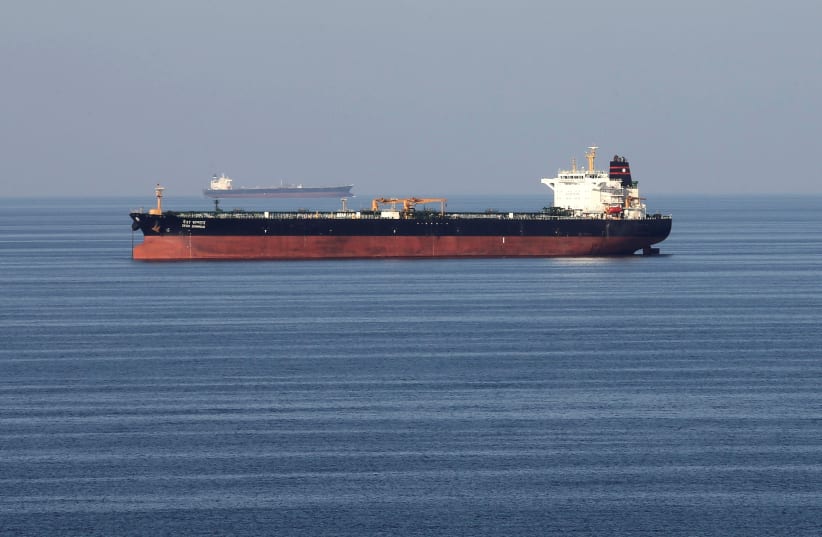The US Navy's 5th Fleet which oversees waters in the Middle East declined to immediately comment, Radio Farda said.
US officials believe that the Panama flagged tanker M/I RIAH was seized by the Iranian Revolutionary Guard on Saturday night, when it was crossing the Strait of Hormuz in international waters. Information from the US intelligence agency indicated that the IRGC troops forced the tanker to enter Iranian territorial waters before withdrawing the vessel to Iran's Qeshm Island.
Tracking data showed that the UAE tanker drifted off into Iranian waters after 11 p.m. on Saturday and stopped transmitting its location over two days ago, according to the Associated Press. US intelligence is still unsure of what exactly happened with the tanker, US officials told CNN.
The Riah is a 58 meter (190 foot) oil tanker which usually traveled between Dubai and Sharjah on the UAE's west coast before going through the strait towards Fujairah on the UAE's east coast.On Tuesday, an foreign ministry spokesperson announced that the UAE tanker was withdrawn to Iranian waters to receive assistance from Iranian forces after suffering from a technical issue, according to the Iranian ISNA news agency. The necessary repairs will be done to the vessel and further details will be announced later according to the spokesperson.As of Wednesday, the crew had still not contacted their base in the UAE since the boat disappeared from radar on July 13, according to Radio Farda. Abbas Mousavi, the spokesman for Iran’s Foreign Ministry, claimed that the tanker's crew had called for help following a technical problem and that Iranian forces had acted according to international regulations.Radio Farda emphasized that the tanker disappeared from radar while sailing through the Straits of Hormuz on July 13, even though tankers usually have a backup generator or communications equipment in the case of an emergency, according to military analyst Hossein Arian.
An official from the UAE told Al Arabiya that the oil tanker is not owned or operated by the UAE and did not send a distress call.
"The tanker in question is neither UAE owned nor operated. It does not carry Emirati personnel and did not emit a distress call. We are monitoring the situation with our international partners," said the official.
The tanker had not switched off its tracking throughout three months of trips around the UAE, Capt. Ranjith Raja of the data firm Refinitiv told the Associated Press on Tuesday. "That is a red flag," said Raja.
Sources from the UAE reported to the US that the tanker had been hit by a mechanical failure and had been withdrawn to the Iranian island for repairs.
Dubai-based Prime Tankers LLC, the vessel's registered owner, told the AP that it had sold the ship to another company called Mouj Al-Bahar, but a man who answered the firm's phone number told the AP that it didn't own any ships, the AP reported.
Although there was no official comment by the UAE, US officials noted that there has been no communication between the tanker's crew and its owners, or with either of the two governments involved, which should happen in the case of a routine repair.
Some US intelligence officials believe that the seizure of the tanker comes as a response to Panama's declaration that it will withdraw its flags on ships that violate US sanctions against Iran.
Earlier in July, British Royal Marines seized a giant Iranian oil tanker in Gibraltar for trying to take oil to Syria in violation of EU sanctions.
Panama's Maritime Authority said on Thursday that Grace 1 was no longer listed in Panama's international boat registry as of May 29.
Iran's Foreign Ministry summoned the British ambassador to voice "its very strong objection to the illegal and unacceptable seizure" of its ship. The diplomatic gesture lifted any doubt over Iran's ownership of the vessel, which flies a Panama flag and is listed as managed by a company in Singapore.
London said the British Heritage tanker operated by oil company BP had been approached in the strait, the main outlet for Middle Eastern oil. "HMS Montrose was forced to position herself between the Iranian vessels and British Heritage and issue verbal warnings to the Iranian vessels, which then turned away," a British government spokesman said in a statement. It urged Iran to "de-escalate the situation in the region."
Iran's Foreign Minister Mohammad Javad Zarif dismissed as "worthless" the allegation that Iran sought to block the ship.
On Saturday, British Foreign Minister Jeremy Hunt said that he had told Iranian Foreign Minister Mohammad Javad Zarif that Britain would facilitate the release of the detained Grace 1 oil tanker if there were guarantees that it would not go to Syria.
On Tuesday, Iran Supreme Leader Ayatollah Ali Khamenei warned that the British seizure of an Iranian oil tanker would not remain "unanswered."
"Evil Britain commits piracy and steals our ship ... and gives it a legal appearance. Iran and those who believe in our system will not leave such evil deeds unanswered," warned Khamenei on Tuesday.
Reuters and Yvette J. Deane contributed to this report.
